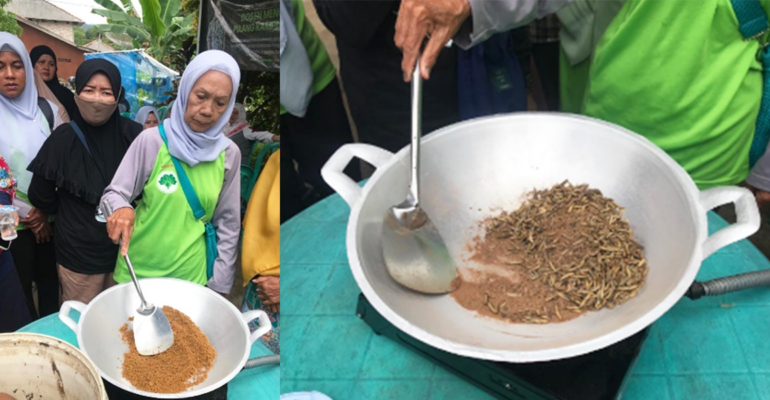IPB University Lecturer Improves Family Economic Welfare through Dried Maggot Processing

IPB University’s Lecturer Service Innovation Program is a momentum for lecturers to make contributions to society. Through this program, two IPB University lecturers, Dr Kastana Sapanli and Muhamad Arifin, SPt, MSi are trying to improve the economic welfare of the community in West Bangka, Bangka Belitung Islands Province.
This effort was taken through training on food waste processing with dried maggots aimed at the Women Farmers Group (KWT) IPAL in Muntok, West Bangka.
“Maggot has gone viral recently because of its ability to break down food waste or other organic waste so that it can tackle the waste problem. “It is hoped that this dry maggot training will have a positive impact on the KWT IPAL Mentok, West Bangka,” said Dr Kastana.
He explained that maggots are larvae of the black soldier fly (BSF) which are not disease vectors like flies in general. For this reason, BSF flies are safe to cultivate.
“BSF flies will produce hundreds of eggs which will become baby maggots or small larvae in about 2-3 days, then the maggots can be harvested at the age of 14-21 days,” he said.
Fresh maggots from the harvest can be given directly to livestock to feed chickens, ducks, or catfish. However, said Dr Kastana, it can also be given as animal feed in the form of dried maggots. Drying maggots is done to facilitate storage and extend shelf life.
Meanwhile, Muhamad Arifin said that processing dried maggots could increase the added value of maggots. The current price of dried maggots on the market is around IDR 50,000-150,000 per kg.
“Drying maggots can be done in the simplest way, namely by roasting them using sand. “Residents in Mentok use finely filtered beach sand because this area is a coastal area,” he said.
He explained further that maggots that are ready to be dried are first cleaned from the cassava (maggot feed) with running water. After that, the maggots are killed first using hot water.
“The maggots are then put into a pan containing hot sand in a ratio of 1:2. “The maggots are roasted for approximately 15 minutes and stirred continuously,” he added.
When the maggot is heated, it will first deflate and then expand again until a popping sound is heard indicating that the heating process is complete. (*/Rz) (IAAS/Res)


